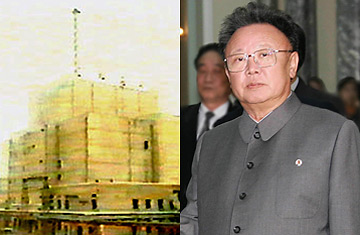
Yongbyon, a nuclear power plant in North Korea (left) and North Korean leader Kim Jong Il.
By reputation, North Korean dictator Kim Jong Il is said to have a fondness for foreign movies. It may be a decent bet that Groundhog Day — the goofy 1993 film in which Bill Murray relives the same day over and over again — is among them. The difference is, Murray does it in Punxsutawney, Pa., while Kim does it on the nuclear stage.
Recall that back in February, Kim's government agreed, during the so-called six-party talks, to shutter its Yongbyon nuclear plant within 60 days of signing what was then billed as a breakthrough agreement. In return, the North would get a variety of economic and diplomatic benefits. After several years of fruitless talks, this seemed like a major diplomatic victory for the Bush Administration and its partners — Japan, South Korea, Russia and China. But Kim delayed moving on Yongbyon until the North got back more than $20 million that had been frozen in a Macau bank account — funds the U.S. believes were tied to the North's various illicit businesses, like narcotics and arms sales. Only after making sure every penny was returned did the North abide by its agreement to shutter Yongbyon, months later.
This week, Kim seems to be playing the same game all over again, attempting to extract far more than was promised in exchange for reining in his nuclear program. On Monday, Chief U.S. envoy Christopher Hill announced after meetings with his counterpart Kim Kae Gwan in Geneva that North Korea had agreed to dismantle its entire nuclear apparatus by the end of the year. Hill said that it was the "first time" North Korea had put such a timetable on its commitment to stand down its entire nuclear program. (And indeed, precisely when the North would get rid of its entire nuclear program — not just the Yongbyon reactor — was not specified in the February agreement.)
But soon after Hill claimed victory, the North upped the ante, as it had in the case of the frozen bank assets. Kim Kae Gwan asserted that in his weekend talks with Hill, the U.S. had agreed to take Pyongyang off its annual list of state sponsors of terrorism. It's a goal the North has long sought, and not just for face-saving reasons: membership on the list, alongside nations such as Iran and Syria, denies North Korea access to economic benefits like low-interest World Bank loans. The February agreement had held out the possibility of such a deal if Pyongyang followed through with denuclearization. But was it true? Hill, arriving in Sydney on Tuesday for the annual Asia Pacific Economic Cooperation forum, flatly denied the U.S. had made such a bargain. "No, they haven't been taken off the terrorism list," he said. And with that, it was Groundhog Day again: the dispute gives the North another reason to dither and dissemble should it so choose. "It can argue that it agreed to provide a full accounting of its nukes in return for being taken off the terrorist list," says one former South Korean diplomat.
The North is already getting some of the economic aid it was promised under the original agreement, so Kim may feel he has some room to pressure the U.S. over the terrorist sponsorship list. And the U.S.'s ability to push back may be limited. Much of the fuel and food aid Pyongyang is now getting comes from South Korea and China. South Korean President Roh Moo Hyun has no incentive to anger Kim now that the two have agreed to a summit in Pyongyang in October. And the Chinese, in this their glorious Olympic year, have already pocketed the idea that the North Korea issue is settled and done with. The last thing Beijing wants is a ruckus over who agreed to what and when.
For its part, the Bush Administration has clearly made the calculation that getting a verifiable agreement on the North's nuclear program is worth pretty much any diplomatic price. In this it may actually be right, assuming the North finally gets beyond Groundhog Day, tells the world exactly what it has, and then gets rid of it. That would be a serious diplomatic achievement. But we're not there yet. And that's why, sometime in the next few months, Washington might quietly strike North Korea off the State Department's list of terror-sponsoring states — and then cross its fingers and hope that that day, like others before it, doesn't return to haunt them.
